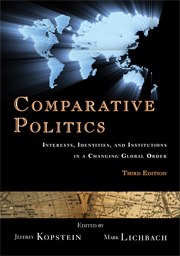Book contents
- Frontmatter
- Contents
- List of Maps
- Preface to the Third Edition
- List of Contributors
- 1 What Is Comparative Politics?
- 2 The Framework of Analysis
- PART ONE EARLY DEVELOPERS
- PART TWO MIDDLE DEVELOPERS
- PART THREE LATE DEVELOPERS
- PART FOUR EXPERIMENTAL DEVELOPERS
- 9 Mexico
- 10 India
- 11 Iran
- 12 South Africa
- 13 The European Union
- 14 Nigeria
- STOP AND COMPARE
- Index
- References
13 - The European Union
from PART FOUR - EXPERIMENTAL DEVELOPERS
- Frontmatter
- Contents
- List of Maps
- Preface to the Third Edition
- List of Contributors
- 1 What Is Comparative Politics?
- 2 The Framework of Analysis
- PART ONE EARLY DEVELOPERS
- PART TWO MIDDLE DEVELOPERS
- PART THREE LATE DEVELOPERS
- PART FOUR EXPERIMENTAL DEVELOPERS
- 9 Mexico
- 10 India
- 11 Iran
- 12 South Africa
- 13 The European Union
- 14 Nigeria
- STOP AND COMPARE
- Index
- References
Summary
Introduction
Students of political science are the first to admit that the European Union is an implausible construct. From our long tradition of scholarship, we know that sovereign states guard their government authority and independence zealously. So why would mature democracies agree to effectively reduce their policy independence and compromise their national sovereignty by transferring many areas of decision making to a supranational organization? Why would countries tie their hands by entering into one of the world's most dramatic examples of economic and political integration?
While the European Union (EU) is not a regular state, it shares many features of nation-states. On the one hand, it has no policing powers and it cannot fall back upon a judiciary to punish those who disobey its laws. It does not possess the legal right to employ coercion. It is also deprived of the legal authority to dictate defense and military policy. On the other, many functions associated with sovereign nation-states fall within the competence of the EU. Moreover, EU law is supreme and takes precedence over national law.
Therefore, the EU is a rare mix of a state and an international organization. It does not meet the traditional definition of a nation-state because it lacks core responsibilities and legal rights, which are considered central aspects of national sovereignty. It cannot employ the use of force to enforce compliance with its laws. It does not possess a proper defense and security dimension.
- Type
- Chapter
- Information
- Comparative PoliticsInterests, Identities, and Institutions in a Changing Global Order, pp. 496 - 533Publisher: Cambridge University PressPrint publication year: 2008



